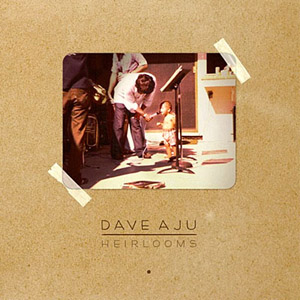Dave Aju Heirlooms
San Francisco producer Dave Aju‘s second full-length is a dense and powerful album, strung together […]

San Francisco producer Dave Aju‘s second full-length is a dense and powerful album, strung together conceptually by the rememberance of Aju’s late father, a jazz musician whose left-behind recordings and instruments play a central role on Heirlooms. Nevertheless, the record that takes shape is not solely concerned with sorrow or loss, as Aju spreads his net wide, covering a large range of complex moods along 10 tracks of impeccably crafted abstract house.
Given the circumstances, one could easily lump Aju into the same category as labelmate Nicolas Jaar, but such attempts would be short-sighted. Clearly, Jaar’s hugely successful 2011 album for Circus Company invited a larger audience to the world of subtle, intellectual house music—an event which his contemporaries, including Aju, have likely benefited from—but still, the California producer proves to be on a path very much his own with this sophomore LP. Unlike Jaar’s Space Is Only Noise, Heirlooms is very much rooted in four-on-the-floor rhythms, using them as anchors to ground the lofty subject matters and sonic abstractions which define the effort. There is a soulfulness too that resonates in each tune here, not only due to the musical qualities of Aju’s chords and basslines, but also due to the themes with which the lyrics are focused. Phrases like “Tick-tock times are tough/Can’t wait for the shoulder shrugs/Can’t pray for the cure-all drug/ Got to lift off and fly above” and such twisted refrains as “Freedom is free of the need to be free” align with much of the lyrical content—there are examinations of struggle, meaning, and self, all displayed with a controlled temperament.
Despite these heavier themes, one is never allowed to forget that Aju makes dance music, and when Heirlooms ups the tempo and turns its aim to the floor, the results are marvelous. “Away Away” digs into a deep shuffle led by static-laden hats and overlayed with a mass of warm chords that glide and turn with a playful ease. Later on, “Caller #7” enlists the assistance of Jaw (from Parisian trio dOP) for a housey take on Prince-esque funk, before moving into more straightforward territory with “You Gotta Know,” a tune that manages to combine the feel of a Detroit basement party with DJ Quik-like percussion and occasional layers of Aju’s own voice. Even with these and the other dancefloor-minded cuts (mainly the Matias Aguayo-reminiscent “Brown & Blue” and the synth-driven “All Together Now”), Aju still keeps his production’s sophistication intact, lacing the tracks with off-kilter noises, unexpected effects, intricate sonic layerings, and thick jazz chord structures topped off by the occasional trumpet and woodwind flourishes.
From a purely home-listening standpoint, the album’s highlights tend to exist on the fringes of house music. In this respect, the record bookends with its most memorable efforts. Both “Rise” and “Revealing” offer up two of Aju’s best vocal performances, with each song stemming from a different side of its maker’s jazz influence—the former displaying a warm, uplifting nature, while the latter spends 10-plus minutes in a more contemplative place amongst side-chained electric piano and vast, noise-laden pads. “Rise” begins the album on a note of confidence as Aju calls on us to “rise” to the sound of swirling organ chords, hand percussion, and revolving cymbals. His vocals sound not too far off from someone like Matthew Dear, layering three or four harmonies on every phrase for a calmly executed sing/talk hybrid. The album’s closer displays slightly more range vocally speaking, as Aju locks into a bouncy lyrical rhythm with trumpets following suit. A little past halfway, “Revealing” sinks into a pulsating trade-off between two heart-wrenching chords, and a thick piling of Aju’s vocal harmonies moves in sync, creating an enveloping pattern.
Heirlooms is a complex record that, truthfully, won’t be suitable for everyone. But for those intrigued by the idea of not-so-straight-up house music, there is a lot to find here, given a little patience and a bit of honest attention. For those who tend to stay away from the more abstract veins of dance music, there’s still something worthwhile to be found, even if doesn’t make sense immediately. Either way, Aju’s adventurous boundary pushes are again a valuable addition to the Circus Company discography.

